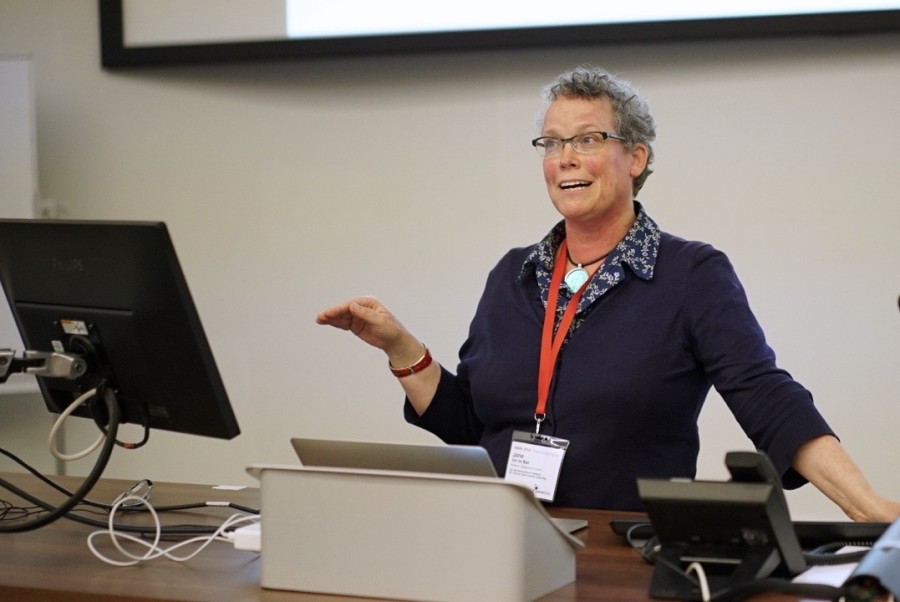Jane Van de Ban spoke at the IWMW 2018 event. In this guest post, the first of a two-part series, she describes her journey on learning to make public presentations.
My Journey to IWMW: How I Learned to Make Public Presentations (part 1)
IWMW 2018 was a special conference for me, because – for the first time – I was a speaker. Alongside Chris Scott, from Headscape, the agency who did our customer journey mapping, I gave a presentation on the customer journey mapping experience Headscape undertook for us and how we used it to inform our work on the Birkbeck website.
And it was brilliant! IWMW attendees are great – really responsive and encouraging. I had some really kind feedback from people who said they’d enjoyed my talk and that they were going to implement some ideas in their own work. But I also had feedback from people who said they would never be able to give a presentation, as they could never be that confident.
 Here’s the thing. I’m a Canadian. People assume that I have always been outspoken and confident and able to do public presentations (and that I speak French and know how to outsmart a grizzly bear). But I remember, years ago, being terrified at the thought of speaking out loud in meetings. I thought, I don’t know what to ask, they’ve probably already answered my questions, they’re going to think I’m not very articulate, they probably won’t answer my questions because they don’t want to – all the classic imposter syndrome stuff.
Here’s the thing. I’m a Canadian. People assume that I have always been outspoken and confident and able to do public presentations (and that I speak French and know how to outsmart a grizzly bear). But I remember, years ago, being terrified at the thought of speaking out loud in meetings. I thought, I don’t know what to ask, they’ve probably already answered my questions, they’re going to think I’m not very articulate, they probably won’t answer my questions because they don’t want to – all the classic imposter syndrome stuff.
So I just wanted to share some of my own journey to becoming an IWMW speaker, and my top tips, because I think making a presentation is something everyone should do.
Learning how to do it
Learning to make presentations is something that I attribute to three roles I’ve had in my working life, each of which contributed to one aspect of being a public speaker.
1. Learning to speak in my own voice
 A long time ago, I left a job because my manager was a bully. My new manager – who was a union activist and a really great people manager – encouraged me to join the union and become a shop steward. So I did. And I had training on how to talk to and represent union members and then further training on how to represent members at grievances and disciplinaries. And then further training on health and safety.
A long time ago, I left a job because my manager was a bully. My new manager – who was a union activist and a really great people manager – encouraged me to join the union and become a shop steward. So I did. And I had training on how to talk to and represent union members and then further training on how to represent members at grievances and disciplinaries. And then further training on health and safety.
And I learned that, if you’re representing someone, you need to:
- know what you’re talking about
- figure out how to ask the questions that will get the answers your members need to make decisions
- learn to be persuasive and negotiate – because you’re dealing with people, not systems
- learn to speak with authority
- find your own voice.
Because it’s important that you do your best to represent someone who needs help. And this started to give me the confidence I needed to speak up.
2. Learning to speak up in formal meetings
When I started working at Birkbeck, I decided to stand for a position as a staff governor.
I remember my first Governor’s meeting – I asked a question, but it was badly phrased, and a bad-tempered fellow Governor (a senior member of Birkbeck’s management) stated that this wasn’t a question that needed to be answered. I felt humiliated and cross. And then I thought: well, let me learn how to do this then, because I really did want an answer to that question.
So what I did was to set myself a challenge: asking at least one question at every Governor’s meeting, to practise doing it. It didn’t matter what it was about (although at the start I wrote them out, so I knew exactly how I was going to phrase it), but I would not finish the meeting without asking a question of the Chair. And, the more I did it – and the more I learned by listening to other governors and the way they phrased their own questions – the easier it got.
And now I ask questions at every meeting I go to (and, yes, I still write them down) because it turns out that’s a really good way to find things out. And it’s a great habit to have.
3. Learning to make presentations
When I first became a web editor at Birkbeck, a lecturer in our Department of Computer Science very generously decided to mentor me. One day I told him that I had to make an important presentation about a new web design to our schools, but that I was nervous and didn’t have much experience. So he invited me – very kindly – to become a guest lecturer for his class, talking about the Birkbeck website.
I was terrified. Not only was this a room full of computer programmers, with no real interest in web content, but Birkbeck students come to class in the evening, after a full day’s work. They are a tough crowd!
But I did it. (After all, I was never going to see these people again.) For my first lecture, I read all the words on my slides, sitting down, and more than half the class fell asleep. So my mentor gave me tips and, surprisingly and very kindly, invited me back again the following year. That time, I had slides but I decided in advance what I wanted to say and I looked at the class (as well as the slides). I picked one or two people and talked directly to them. I also stood up and I asked them questions. Again, my mentor gave me feedback on how to improve my presentation.
I was the guest lecturer for this mentor for four years and, after he retired, I was taken on by his successor. This is going to be my 14th year as a guest lecturer for a class of wannabe computer science programmers, not one of whom ever has anything to do with web content. (I know this because I ask them.)
In addition, I make presentations to our senior management team, our schools, our web maintainers – and, at last, IWMW. And all this practice means that I keep learning how to do it better.
Now no one falls asleep in my presentations.
Acknowledgements: Images used in this post taken from Unsplash (photos for everyone) including woman using megaphone (taken by Clem Onojeghuo) and maple leaf (taken by Guillaume Jaillet). The featured image of Jane van de Ban was taken by Rich Pitkin, IWMW 2018 photographer and published in the summary of the first day of the IWMW 2018 event.
Biographical details
 Jane Van de Ban is Web Content Manager for Birkbeck, University of London, where she leads a digital content team responsible for redeveloping the website, alongside Birkbeck’s expert technical web team.
Jane Van de Ban is Web Content Manager for Birkbeck, University of London, where she leads a digital content team responsible for redeveloping the website, alongside Birkbeck’s expert technical web team.
With more than 20 years’ experience working for the University of London, first in print publications and then in web, Jane has particular expertise in how to deliver content that meets student needs. An active networker, Jane has also introduced successful collaborative methods of working both to improve efficiency and transparency for Birkbeck. Plus she has provided numerous presentations and training sessions to both staff and students.
Jane together with Chris Scott, Headscape, gave a plenary talk on “Telling the Birkbeck Story: How Customer Journey Mapping Helped Us Develop Our New Approach to Web” at the IWMW 2018 event.
- Job title: Web Content Manager
- Email: j.van-de-ban@bbk.ac.uk
- LinkedIn: jane-van-de-ban-3304612b
- Institutional web site: http://www.bbk.ac.uk/


